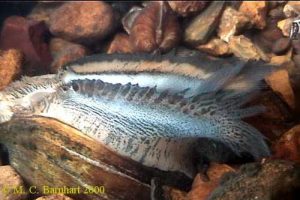Is Contaminant Removal by Freshwater Mussels as an Ecosystem Service?
 Ecosystem services are nature’s benefits to people. Freshwater mussels perform many functions that are vital to lake and stream ecosystem integrity, including, water filtration, oxygenating sediments, and nutrient cycling. As mussels process water for nutritional gain, they remove bacteria, algae, and other particles through filter-feeding. They also incidentally ingest any pollutants that are present, and many of these pollutants accumulate in their tissues. Because each individual can filter several liters of water daily, and mussels comprise a large proportion of benthic biomass in many waterways, there is great potential for mussel populations to sequester and amass contaminants.
Ecosystem services are nature’s benefits to people. Freshwater mussels perform many functions that are vital to lake and stream ecosystem integrity, including, water filtration, oxygenating sediments, and nutrient cycling. As mussels process water for nutritional gain, they remove bacteria, algae, and other particles through filter-feeding. They also incidentally ingest any pollutants that are present, and many of these pollutants accumulate in their tissues. Because each individual can filter several liters of water daily, and mussels comprise a large proportion of benthic biomass in many waterways, there is great potential for mussel populations to sequester and amass contaminants.
My dissertation research centers on quantifying the ecological function of contaminant removal by North American native freshwater mussels at the population level, determining whether masses of contaminant sequestration in context with environmental availability may be an ecosystem service, and using social science methods to explore human perceptions of water quality and associated regulating factors. The main objectives of my research are to: (1) understand the role of native freshwater mussel populations in removing or transforming contaminants in surface waters as an inherent benefit of their filter- and deposit-feeding ecology, balanced against the potential harm of such contaminants to mussel population health and reduction of other beneficial ecosystem services they provide; (2) understand how people perceive water quality, learn about their level of awareness of factors that affect water quality (natural or industrial), and determine how people view the connectedness of water quality and its regulating factors (such as filtration by native mussels) to their own well-being.